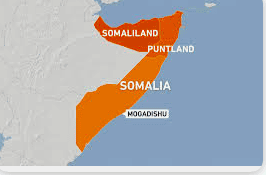The Sovereignty of Somaliland: A Dilemma of National pride and international interests.
By : Agnes Gitau
The sovereignty of Somaliland has increasingly become a topic of political discourse, with growing regional and international interests. Earlier this month, former UK Secretary of State for Defence, Rt Hon Gavin Williamson, suggested that Somaliland’s formal recognition might be pursued under the Trump administration. Meanwhile, October debates in the UK’s House of Lords underscored Britain’s interest in maintaining close ties with Somaliland, reflecting the direction and interests and international geopolitics, particularly in areas like maritime security, trade logistics, and energy.
The quest for Somaliland’s independence intersects with the competing interests of global powers, often at the expense of regional peace and stability.
These debates in these corridors of power in the West have raised concerns about the intersection of national pride and strategic interests, particularly in sectors like maritime, global trade logistics and energy. These dynamics reveal a complex web of motivations driving the pursuit of Somaliland’s independence, where global powers’ interests in the region’s resources are
sometimes prioritised at the cost of regional peace and stability as well as the aspirations for sovereignty ( Somaliland).
For businesses and stakeholders in the Horn of Africa, It is important to weigh and consider the geopolitical landscape, unpack the opportunities and risks this development may have on their operations.
Background
The discussions in the UK’s House of Lords highlighted the country’s historical ties to Somaliland as a former protectorate and the Somali diaspora’s influence in Britain. Members emphasised Somaliland’s democratic governance and relative peace as a model for engagement and support. Concerns about the African Union’s (AU) stance on territorial integrity and fears of destabilising Somalia were acknowledged, with calls for a diplomatic, nuanced approach to these sensitivities. Somaliland’s strategic importance for maritime trade and regional security further underpinned the House of Lords arguments for closer collaboration.
If the United States, duringTrump’s second term recognises Somaliland’s sovereignty, the move would reflect broader strategic calculations, including countering regional threats from Iran and Houthi forces near the Bab el-Mandeb Strait. Recognition could establish Somaliland as a vital ally in the Horn of Africa, complementing U.S. partnerships with Ethiopia, the UAE, and Israel.
This scenario recalls Trump’s recognition and signals Trump’s willingness to challenge established norms for geopolitical gains.
Recognition of Somaliland as a sovereign state would certainly have significant regional implications. For Ethiopia, an opportunity to diversify its trade routes by enhancing access to the Berbera Port, hence reducing dependence on Djibouti and mitigating tensions with Eritrea.
However, critics argue it could trigger other separatist movements within Somalia, like Puntland, this could have a devastating impact in the region. The commitment by the African Union to preserving borders presents another obstacle, as does potential opposition from key players like Turkey and China, who maintain strong ties with Somalia. Additionally, unresolved border disputes and clan-based tensions within Somaliland could jeopardise its stability even after recognition.
From a business perspective, recognition presents both opportunities and risks. Enhanced trade and logistics through Somaliland could benefit companies reliant on the Red Sea corridor, while international engagement might contribute to regional peace and attract investment in infrastructure and maritime security. However, Businesses and policymakers must approach
this issue with caution, balancing strategic interests against the potential for unintended consequences.
Agnes Gitau is an international development professional working at the intersection of institutions, policy, and
politics to advance economic development. She focuses on ESG, sustainable financing, African regional
trade development, and financial and digital inclusion.
